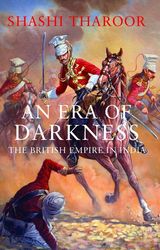
As I write these words, the vice president of India, the erudite former diplomat Hamid Ansari, has just launched my new book An Era of Darkness: the British Empire in India. It is a book that, somewhat unusually, began as a speech.
At the end of May 2015, I was invited by the Oxford Union to speak on the proposition ‘Britain Owes Reparations to Her Former Colonies’. Since I was already scheduled to speak at the Hay Festival of Literature later that week, I thought it might be pleasant to stop in Oxford on the way and debate there again (as I had once done, on behalf of the United Nations, a decade earlier). The event, on the Union’s impressive wood-panelled premises, dating back to 1879, was a success and I left pleased enough, but without giving the proceedings a second thought.
In early July, however, the Union posted the debate on the web, and sent me a video copy of my own speech. I promptly tweeted a link to it—and watched in astonishment as it went viral. Within hours it was being downloaded and replicated on hundreds of sites, sent out on WhatsApp and forwarded by email. One site swiftly crossed over three million views; others did not keep track, but reported record numbers of hits. Rightwing critics of mine suspended their ‘trolling’ of me on social media to hail my speech. The speaker of the Lok Sabha, Sumitra Mahajan, went out of her way to laud me at a function attended by the prime minister, Narendra Modi, who then congratulated me publicly for having said ‘the right things at the right place’. Schools and colleges played the speech to their students; one university, the Central University of Jammu, organised a day-long seminar at which eminent scholars addressed specific points I had raised. Hundreds of articles were written, for and against what I had said. For months, I kept meeting strangers who came up to me in public places to praise my ‘Oxford speech’.
I was pleasantly surprised but also a bit perplexed. For one thing, though I had spoken well enough for my side to win the debate by a two-thirds majority of the audience, I knew I had made better speeches that had not acquired a tenth of the fan following this one had. For another, I honestly did not think I had said anything terribly new. Similar things had been said by Indian nationalists in the late nineteenth century, and by Jawaharlal Nehru and a host of others in the twentieth.
Yet, the fact that my speech struck such a chord with so many listeners suggested that what I considered basic was unfamiliar to many, perhaps most, educated Indians. They reacted as if I had opened their eyes, instead of merely reiterating what they had already known.

It was this realisation that prompted my publisher friend David Davidar to insist I convert my speech into a short book—something that could be read and digested by the layman but also be a valuable source of reference to students and others looking for the basic facts about India’s experience with British colonialism. The moral urgency of explaining to today’s Indians why colonialism was the horror it turned out to be could not be put aside.
In four months’ time, the book will also be published in Britain, which has been suffering from a kind of historical amnesia about colonialism. As the book emerged from the press in India, an article by a Pakistani writer in The Guardian pointed out that the Brits simply don’t teach their own schoolchildren the truth about their colonial past. Many Brits are genuinely unaware of the atrocities committed by their ancestors, and live in the blissful illusion that the Empire was some sort of benign blessing for the ignorant natives. There’s been a lot of self-justificatory mythologising in Britain about the colonial era. Many of the popular histories of the British Empire in the last decade or two, by the likes of Niall Ferguson and Lawrence James, have painted it in rosy colours, and this needed to be challenged. Popular television shows tend to focus only on the romanticised aspects of the raj. All this explains Britons’ ignorance, but does not excuse it.
My book is not intended to have any bearing on today’s Indo-British relationship. That is now between two sovereign and equal nations. Indeed, when these words appear British Prime Minister Theresa May will have concluded a visit to India seeking investment from here in her post-Brexit economy. As I’ve often argued, you don’t need to seek revenge upon history. History is its own revenge.
Source: http://www.theweek.in/columns/shashi-tharoor/curing-historical-amnesia.html
